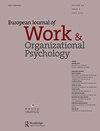工作中的日常社会支持接收和提供:识别层次数据中的支持交换模式
IF 3.4
2区 心理学
Q2 MANAGEMENT
European Journal of Work and Organizational Psychology
Pub Date : 2023-02-14
DOI:10.1080/1359432X.2023.2177537
引用次数: 1
摘要
摘要互惠准则提出,获得支持的人有义务返还所获得的福利。然而,员工如何调节彼此之间的社会支持的相互流动并不总是遵循互惠的动态,这可能会根据社会交流是否获得、消耗或节约资源而对员工的结果产生不同的影响。为了更好地理解支持交换模式及其与员工日常生活中的基本需求满意度(自主性、能力和相关性)和情绪衰竭的关系,我们进行了多层次的潜在特征分析(N = 124名员工,894人 天)。在日常层面上,我们确定了四种不同的支持交换模式,即接受和提供的社会支持(即低往复、低往复、高往复和高往复天数)。在个人层面,我们确定了三类员工的支持交换,不同程度的员工随着时间的推移表现出一定的支持交换特征(即,过度互动、低互动和高互动)。与多项逻辑回归的配对比较显示,在往复的日子里,自主性和相关性的需求满意度最高,情绪衰竭程度最低。此外,过度互惠者最有可能满足他们对自主性的需求。我们讨论了我们的发现在理论和实践上的贡献。本文章由计算机程序翻译,如有差异,请以英文原文为准。
Daily receiving and providing of social support at work: identifying support exchange patterns in hierarchical data
ABSTRACT The norm of reciprocity proposes that one who receives support feels obliged to return obtained benefits. Yet how employees regulate the mutual flow of social support with one another does not always follow a reciprocal dynamic, which may have different implications for employee outcomes based on whether social exchanges gain, drain or conserve resources. To better understand support exchange patterns and their relationship with basic need satisfaction (for autonomy, competence and relatedness) and emotional exhaustion in employees’ daily lives, we performed a multilevel latent profile analysis (N = 124 employees, 894 days). At the day level, we identified four support exchange profiles differing in low vs high received and provided social support (i.e., low-reciprocating, under-reciprocating, over-reciprocating and high-reciprocating days). At the person level, we identified three support exchange classes of employees, differing in the degree to which employees showed certain support exchange profiles over time (i.e., over-reciprocators, low-reciprocators and high-reciprocators). Pairwise comparisons with multinomial logistic regression revealed that over-reciprocating days were associated with the highest levels of need satisfaction for autonomy and relatedness and the lowest levels of emotional exhaustion. Moreover, over-reciprocators were most likely to satisfy their needs for autonomy. We discuss theoretical and practical contributions of our findings.
求助全文
通过发布文献求助,成功后即可免费获取论文全文。
去求助
来源期刊
CiteScore
8.00
自引率
2.30%
发文量
40
期刊介绍:
The mission of the European Journal of Work and Organizational Psychology is to promote and support the development of Work and Organizational Psychology by publishing high-quality scientific articles that improve our understanding of phenomena occurring in work and organizational settings. The journal publishes empirical, theoretical, methodological, and review articles that are relevant to real-world situations. The journal has a world-wide authorship, readership and editorial board. Submissions from all around the world are invited.

 求助内容:
求助内容: 应助结果提醒方式:
应助结果提醒方式:


